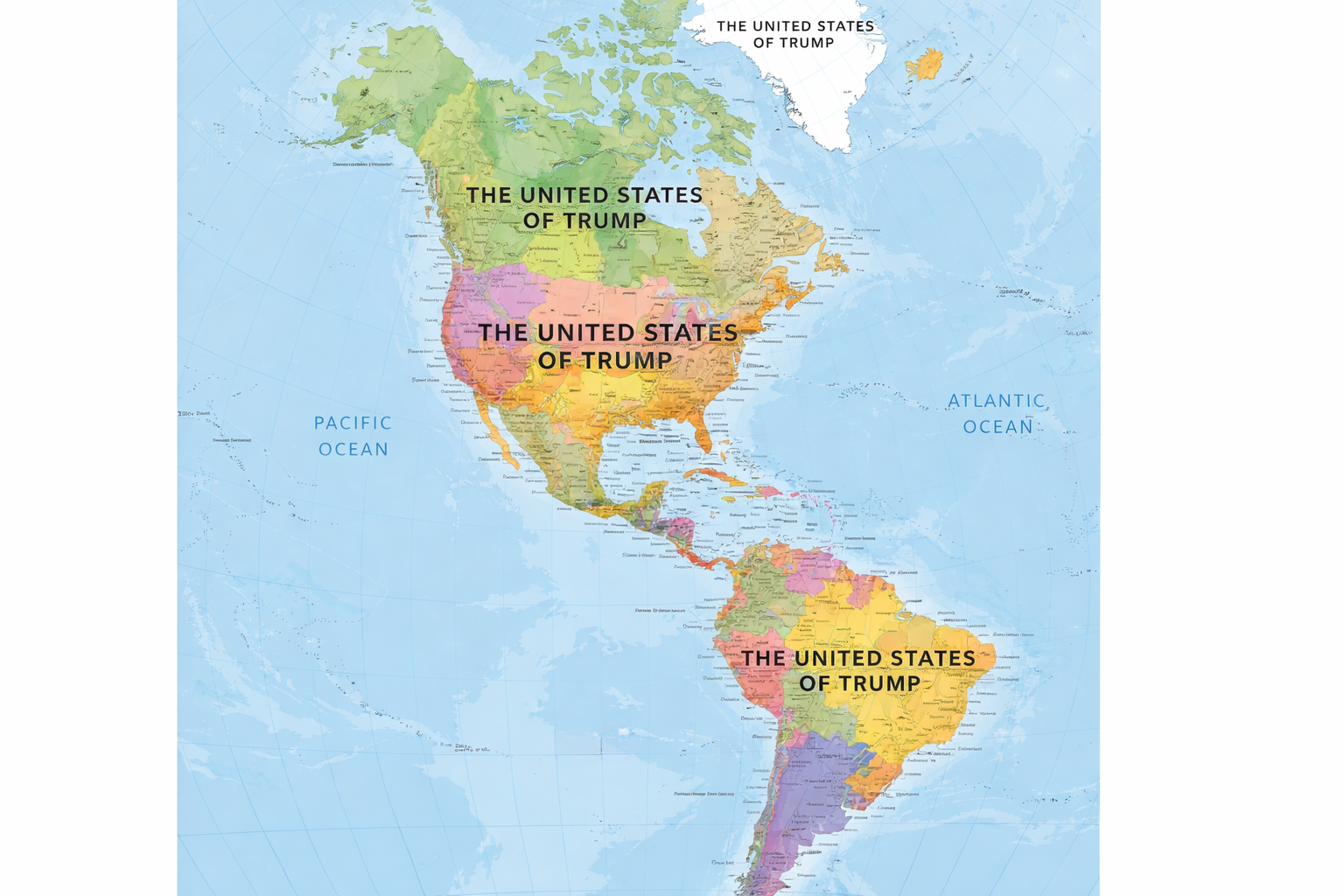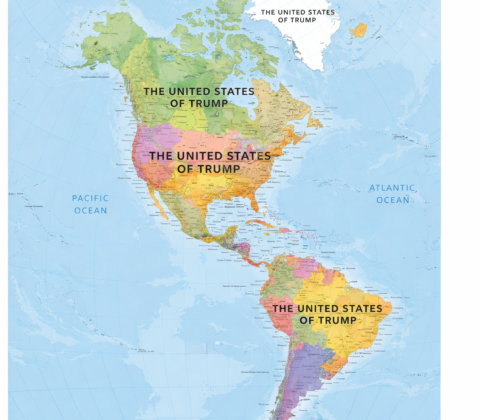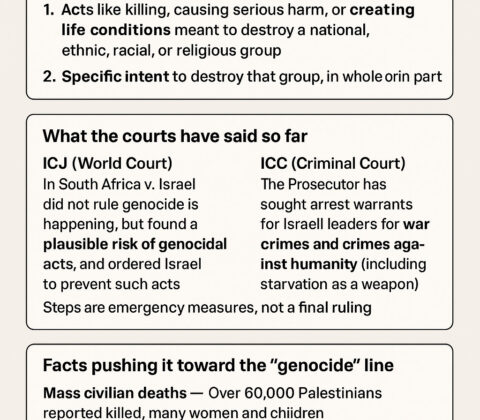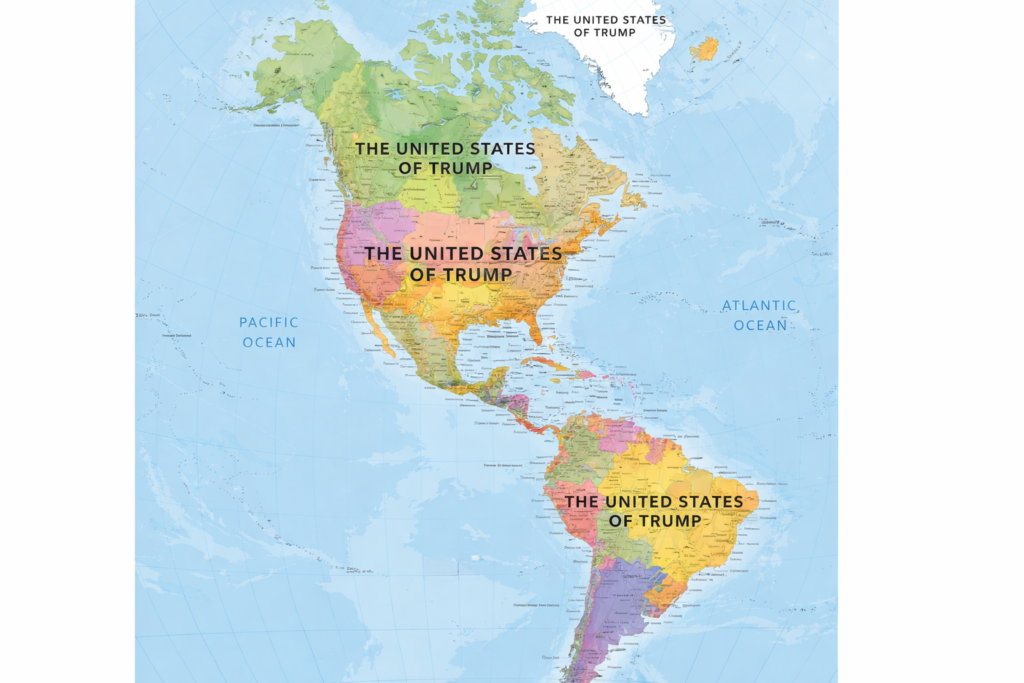Skip to content






The legal definition
The sticking point
Posts in Category: International


BREAKING NEWS: TOP SECRET MAP LEAKED FROM WHITE HOUSE PRINTING HOUSE!
BREAKING NEWS: TOP SECRET MAP LEAKED FROM WHITE HOUSE PRINTING HOUSE!
Washington, D.C. – January 3, 2026 – In a stunning development that has sent shockwaves through the corridors of power (and probably a few golf carts), unnamed sources have secreted away a highly classified parody map from the White House Printing House. This explosive document, dubbed “The United States of Trump,” reveals what insiders are calling the President’s most ambitious secret plan yet: to incorporate ALL of the Americas – North, South, Central, and even those sneaky islands – plus Greenland into one glorious, untied mega-nation!According to the leaked map, which features bold red lines redrawn with what appears to be a Sharpie (classic Trump touch), the new “United States of Trump” would stretch from the icy tip of Greenland (because, why not? It’s got great real estate potential) all the way down to the southernmost penguin parties in Antarctica – wait, no, just the Americas, but let’s be honest, penguins might be next. Key highlights include:
-
Canada renamed “Trump North” – “Because it’s basically our hat anyway,” per anonymous whispers.
-
Mexico becomes “Trump Wall Wonderland” – Complete with luxury resorts on both sides of the… well, you know.
-
Brazil as “Trump Amazon Prime” – Free two-day shipping on rainforests!
-
Greenland dubbed “Trump’s Ice Palace” – Plans include melting it for premium bottled water branded “Trump Melt.”
-
The entire continent unified under one flag: Stars, stripes, and a giant golden T.
The map, allegedly printed on super-secret White House stationery (with watermarks of tiny MAGA hats), outlines Trump’s masterstroke to “Make America Yuge Again” by absorbing neighbors through “deals so good, they’ll beg to join.” Unnamed sources claim this was hatched during late-night tweet storms, with input from shadowy advisors like “that guy from the MyPillow ads.”White House officials have neither confirmed nor denied the leak, but a spokesperson muttered something about “fake news” while nervously shredding documents. Meanwhile, international leaders are reportedly in panic mode – Trudeau’s already packing his hockey sticks, and Denmark’s like, “Greenland? Again?!”



Who is behind the Venezuela actions?
Based on recent reporting (as of November 24, 2025), the push isn’t coming from shadowy outsiders but from Trump’s inner foreign policy circle, blending immigration hardliners, Latin America obsessives, and national security vets. Critics like Sen. Rand Paul have called it out directly: “Regime change is not in Trump’s psyche,” but advisors like Rubio and Graham are “more inclined to believe in it” and have his ear.
The result? A policy that’s escalated faster than Trump’s first term, with lethal ops approved but execution delegated.
Here’s a rundown of the main architects, drawn from State Department briefings, leaks, and analyses:
Figure |
Role in Trump Admin |
Influence on Venezuela Policy |
Key Details |
|---|---|---|---|
Marco Rubio |
Secretary of State & National Security Adviser |
Primary driver; reframed “democracy promotion” into narco-terrorist strikes and regime ouster. Designated Cartel de los Soles as FTO today (Nov. 24). |
Longtime Maduro foe (Cuban roots fuel personal stake); killed a Grenell-led diplomatic thaw; pushing internal strikes beyond boats. |
Stephen Miller |
Deputy Chief of Staff for Policy & Homeland Security Adviser |
Orchestrates boat strikes and “narco-state” narrative; links it to border security and deportations. |
Directed Sept. 2025 strikes; calls Maduro’s regime a “central hub” for drugs/humans; allies with Rubio on military escalation, shifting from stability to confrontation. |
Lindsey Graham |
Senate Foreign Relations Chair (incoming) |
Informal influencer; whispers regime change in Trump’s ear alongside Rubio. |
Paul flags him as a key pusher for intervention, risking MAGA backlash; backs military aid to opposition.responsiblestatecraft.org
|
John Ratcliffe |
CIA Director |
Oversees covert ops, including lethal authorizations inside Venezuela. |
Project 2025 contributor; his chapter on intel reform enables expanded black ops against Maduro allies. |
This crew—many recycled from Trump’s first term or Project 2025—handles the heavy lifting: Rubio at State calls the shots on designations and diplomacy, Miller ties it to domestic wins like fentanyl seizures, and the CIA executes under Ratcliffe. Trump’s greenlit the big moves (e.g., USS Ford deployment), but the plotting? That’s their wheelhouse, often bypassing Congress per Paul’s CBS interview.
it’s more old-school hawks chasing oil leverage and anti-leftist scores.


Gaza
On
- International
Opinion as of August 12, 2025
Is What’s Happening in Gaza Genocide?
The legal definition
Under the Genocide Convention, genocide means:
-
Acts like killing, causing serious harm, or creating life conditions meant to destroy a national, ethnic, racial, or religious group; plus
-
Specific intent to destroy that group, in whole or in part.
What the courts have said so far
-
ICJ (World Court) – In South Africa v. Israel, the Court did not rule genocide is happening, but found a plausible risk of genocidal acts and ordered Israel to:
-
Prevent such acts
-
Allow more humanitarian aid
-
Stop incitement to commit genocide
These are emergency measures, not a final ruling.
-
-
ICC (Criminal Court) – The Prosecutor has sought arrest warrants for Israeli leaders for war crimes and crimes against humanity (including starvation as a weapon). This is separate from genocide charges.
Facts pushing it toward the “genocide” line
-
Mass civilian deaths – Over 60,000 Palestinians reported killed, many women and children.
-
Destructive living conditions – UN reports famine-level deprivation, child deaths from malnutrition, and aid far below survival needs.
-
Patterns of conduct – Ongoing strikes in civilian-heavy areas and restricted aid delivery despite court orders.
The sticking point
The key unresolved question is specific intent — whether the goal is to destroy Palestinians as such or, as Israel claims, to destroy Hamas while minimizing civilian harm. Courts often infer intent from patterns, policies, and rhetoric — but this is still under litigation.
Bottom line
-
Already established: Alleged war crimes and crimes against humanity.
-
ICJ finding: Plausible risk of genocide, urgent prevention measures ordered.
-
Not yet decided: Final ruling on genocide — hinges on proving intent to destroy the group.
-
Human reality: Civilian death toll, destruction, and deprivation are at levels many scholars say are perilously close to meeting the legal definition.


U.S. Navy is “too intimidated” so they have to KILL THEM ALL
You try to write a joke about the U.S. Navy being “too intimidated” to capture those big, bad, fiberglass outboard-powered drug boats — you know, the ones running on lawnmower engines and vibes — but then reality steps in and writes something better.
Apparently the Navy’s standard operating procedure now is:
See fast boat → panic → blow it up → hope nobody asks questions.
All hands lost, problem solved, paperwork minimal.
Meanwhile, Little Sister Coast Guard didn’t get the memo.
They stroll out there in their white hulls, sunglasses on, probably listening to classic rock, and say:
“Hey, is that a massive oil tanker violating sanctions?”
Then they just… take it.
No shots.
No explosions.
No Hollywood soundtrack.
Just: “Sir, we’re boarding your ship now.”
And the Venezuelan captain — what, was he smoking a joint the size of a flare gun? — basically shrugs and lets them.
You can’t even parody this anymore.
The Navy vaporizes fishing boats like they’re the Death Star, and the Coast Guard arrests an entire tanker crew like they’re checking fishing licenses.
When the joke becomes more realistic than the real event, satire just packs up and goes home.
Could it be, Trump wants the Oil and there wasn’t any Drugs?
Share this:
Like this: